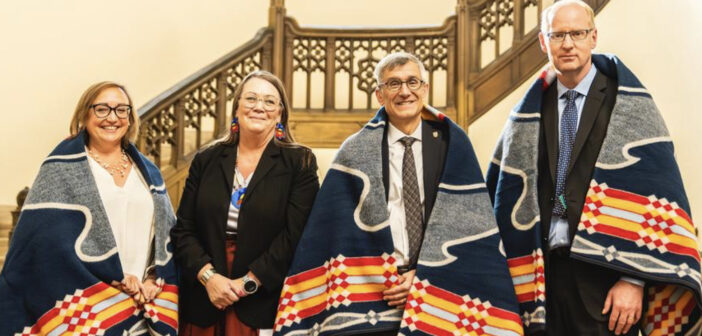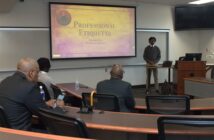Lehigh University will now have an office within its Institute of Indigenous Studies for the Delaware Nation, a Native American tribe indigenous to Pennsylvania, to be connected to their homeland once again.
The university signed a memorandum of understanding with the tribe last month to establish this link.
The Delaware Nation is currently headquartered in Oklahoma, where they relocated in the mid-1900s due to backlash from the United States government. Pennsylvania, the original homeland of the tribe, has no federally recognized reservations, limiting the reach of the indigenous community here.
The partnership was created to increase the reach and build the community of indigenous people at Lehigh, which currently has an indigenous population of about six students and about four faculty members, said Carly Camplain, professor of indigenous health, law, and policy, who is one of the few indigenous faculty members.
Alongside her, the other indigenous faculty members include Joseph Pacheco, a community and population health professor; Holona Ochs, a political science professor; and Ho’o Hee, a design professor.
“Being a Native where there’s not a ton of Natives is very tough, and so I’m looking forward to helping (to) hopefully grow that population here, and not just have professors and staff but students as well,” Camplain said.
Sean Daley, the director of the Institute of Indigenous Studies, said Lehigh hopes to offer and streamline opportunities for faculty and staff to work with the Delaware Nation. He also said that with a very limited number of colleges nationwide increasing outreach to indigenous communities, Lehigh is an innovator in the realm.
He said one of the goals is to start a pipeline program to bring Delaware Nation students to Lehigh.
“When they’re looking at colleges now, Lehigh will be one of the schools to drive talks about and encourage students to visit,” Daley said.
The partnership between the university and the tribe may help advance the future of both the College of Health and more specifically, the newfound Institute of Indigenous Studies that premiered in 2020.
Daley said the institute is a space where graduate students and undergraduate students interested in minors such as indigenous peoples’ health can find something to study, and the institute hopes to create majors as well.
The end goal, he said, is for Lehigh to be known as a place laying the groundwork for the study of indigenous peoples.
“You would be surprised how many Native students, whether they are going into biology, whether they’re going into international relations…still want to do some sort of indigenous studies because it’s our heritage,” said Isabelle Canadine, ‘27, an indigenous student. “It’s what’s important to us.”
Even with all these positive aspects, Canadine said some concerns might still arise about the partnership between a largely endowed school and an indigenous tribe that has already had its land stolen by the school once before.
She said her only concern is the idea of “white saviorism,” a concept describing white people who act from a place of superiority to rescue people of color, according to the health and wellness website Health. She is also worried it perpetuates the idea that indigenous people should feel like they are “better off” with assistance from others.
“You have to bring respect where you’re going, especially with indigenous communities,” Canadine said.






Comment policy
Comments posted to The Brown and White website are reviewed by a moderator before being approved. Incendiary speech or harassing language, including comments targeted at individuals, may be deemed unacceptable and not published. Spam and other soliciting will also be declined.
The Brown and White also reserves the right to not publish entirely anonymous comments.